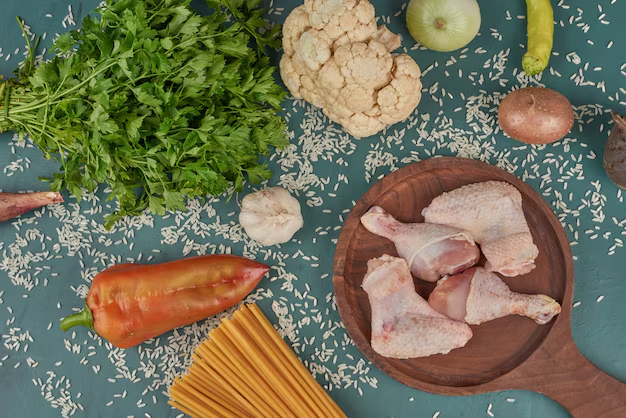Discover How Long Cooked Chicken Can Safely Stay in Your Refrigerator
Imagine enjoying a savory, perfectly roasted chicken for dinner, and then pondering what to do with the leftovers. The lingering question is, "How long can you keep that delicious roasted chicken in the refrigerator before it becomes unsafe to eat?" It's an essential inquiry for anyone aiming to maximize food safety and minimize waste. Let's explore this topic in detail.
🕒 Understanding the Shelf Life of Cooked Chicken
The Rule of Thumb
When it comes to storing cooked chicken, including roasted chicken, the general guideline is 3 to 4 days in the refrigerator. This timespan keeps your leftovers within a safe zone to prevent bacterial growth. The crucial aspect is maintaining the right refrigerator temperature, which should be at or below 40°F (4°C).
🥡 Factors Affecting Freshness
Several factors can influence how long your cooked chicken remains fresh:
- Temperature Continuity: Ensuring your refrigerator consistently stays at the appropriate temperature is key.
- Storage Method: Use airtight containers to slow down spoilage and maintain moisture.
- Proper Handling: Wash your hands and utensils to avoid cross-contamination when storing leftovers.
By considering these elements, you can help preserve the taste and safety of your cooked chicken.
🏷️ How to Store Roasted Chicken Appropriately
Immediate Storing Tips
Proper storage starts the moment the meal is over:
- Time it Right: Don’t leave cooked chicken out at room temperature for more than 2 hours.
- Seal it Well: Use airtight containers or wrap it tightly with aluminum foil or plastic wrap.
- Label and Date: This helps you keep track of when it was cooked, aiding timely consumption.
Optimizing Storage Containers
Choosing the right storage container also plays a role:
- Glass or BPA-free Plastic Containers: These are ideal for maintaining freshness.
- Vacuum Sealed Bags: They offer longer shelf life by minimizing air exposure.
Utilizing the Freezer
If you know you won't consume the chicken within a few days, consider freezing:
- Freezing Extends Shelf Life: Properly wrapped chicken can last up to 4 months in the freezer.
- Thawing Safely: Thaw frozen chicken in the refrigerator, not at room temperature, to maintain safety.
🔍 Identifying Signs of Spoilage
What to Look For
Even with optimal storage, it's imperative to regularly check for spoilage. Here are some signs that indicate your roasted chicken might have gone bad:
- Smell: A sour, off-putting odor is an immediate red flag.
- Texture: Slimy or sticky feel rather than a firm texture.
- Color: Discoloration towards gray or greenish shades is a cause for concern.
When in Doubt, Throw it Out
It's a common saying but for a good reason. The risk of foodborne illness isn't worth holding onto suspicious leftovers. Trust your instincts.
🍽️ Who Benefits from Knowing Storage Best Practices?
Busy Households
People juggling multiple commitments benefit significantly by minimizing food waste through proper storage techniques. They can prepare meals in advance knowing they will remain safe to eat.
Health Conscious Individuals
For those who prioritize health and nutrition, understanding food safety is essential in preventing foodborne illnesses without compromising quality.
🥗 Diversifying Leftover Usage
Instead of letting leftovers sit idle until they spoil, immediately incorporating them into new meals is a wonderful approach. Here are some creative ways:
- Chicken Salad: Combine with greens, nuts, and fruits for a refreshing meal.
- Wraps & Sandwiches: Make quick lunches by adding vegetables and sauces.
- Pasta & Rice Dishes: Enhance flavor profiles by tossing into pasta or rice.
💡 Quick Tips for Extending Freshness
Here's a summary of practical tips to enhance the longevity and taste of your roasted chicken:
- Temperature Maintenance: Keep the fridge below 40°F (4°C) 🍂.
- Air-Tight Seal: Store in containers with tight lids 🥡.
- Prompt Freezing: Freeze if uneaten within 3-4 days ❄️.
- Visibility: Place leftovers at the front of your fridge for easy access 👀.
- Routine Checks: Regularly check for freshness before consumption 🔍.
Conclusion: Prioritize Safety and Enjoy Leftovers
Understanding how to store and assess the freshness of roasted chicken is vital for food safety and enjoyment. By following these guidelines, you can confidently prevent spoilage, enjoy your meal's flavors longer, and reduce waste — all without uncertainty. Whether you're saving time in your busy schedule or savoring the joys of leftovers creatively, these practices enrich kitchen experiences across households.

